GKB: Geodemographics Knowledge Base
MRS Census Questionnaire Results
The MRS Census and GeoDems Group (MRS CGG) was established in 1989 and is a leading independent voice in the geodemographics sector. Part of The Market Research Society, it exists to promote the full use of Census and geodemographic information. It works with the Office for National Statistics (ONS) and others to represent the needs of research.
As you may be aware, UK national censuses may be changing away from a questionnaire which is sent to all UK households every ten years. Instead, future censuses may rely on existing government databases and survey research. This may result in faster and more frequent releases of some census data, but may also mean that much census data would no longer be available for small geographic areas.
In advance of the ONS Census Consultation, which is scheduled to open in June 2023, MRS CGG decided to launch a survey, which was sent to our MRS Company Partner employees, to ascertain their organisation's use of census data and find out their thoughts on the proposed census changes.
MRS continue to be committed to represent the views of our Members and Company Partners and have sent a letter to ONS based on the results below. We will be actively involved in the upcoming consultation and will be encouraging our members to participate too, therefore ensuring a fully representative view.
Firstly, we needed to ascertain what kind of organisation the respondent worked for:
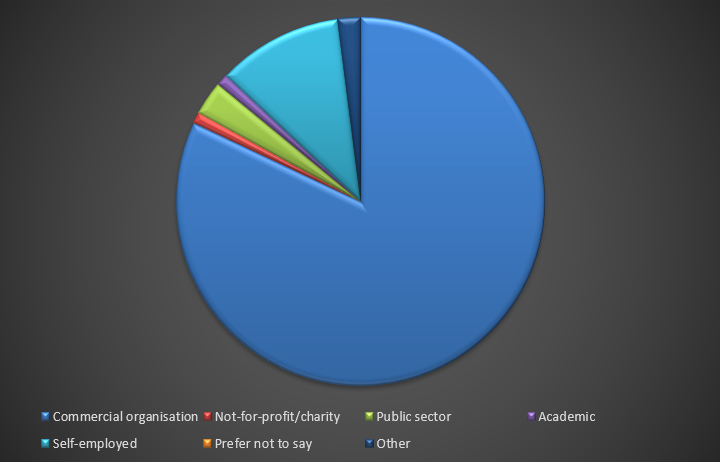
|
Answer |
% |
|
Commercial organisation |
82% |
|
Not-for-profit/charity |
1% |
|
Public sector |
3% |
|
Academic |
1% |
|
Self-employed |
11% |
|
Prefer not to say |
0% |
|
Other |
2% |
|
Total |
100% |
Response Base Number: 104
We then asked which parts of the UK does their organisation use census data (this was a multi choice question):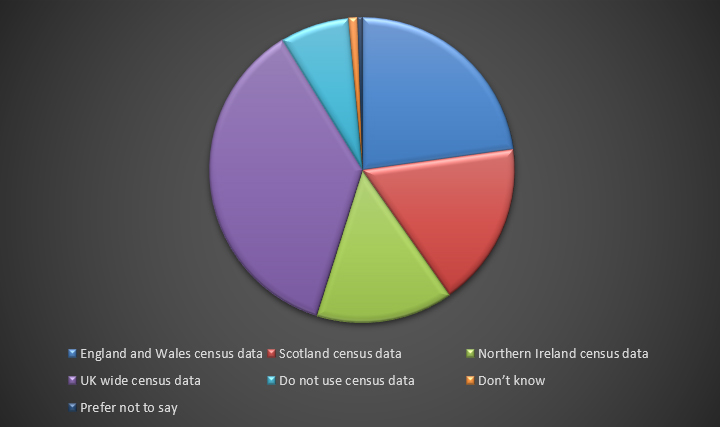
|
Answer |
% |
|
England and Wales census data |
47% |
|
Scotland census data |
36% |
|
Northern Ireland census data |
30% |
|
UK wide census data |
75% |
|
Do not use census data |
15% |
|
Don’t know |
2% |
|
Prefer not to say |
1% |
|
Total |
100% |
Response Base Number: 98
We asked how important UK census data is to their organisation: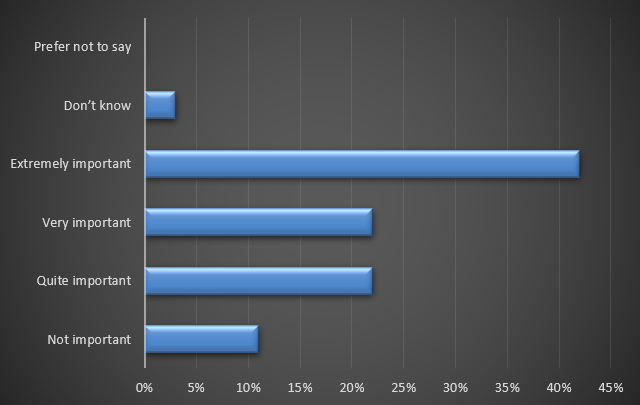
|
Not important
|
Quite important 22% |
Very important 22% |
Extremely important 42% |
Don’t know 3% |
Prefer not to say 0% |
Response Base Number: 94
We asked what their organisation uses census data for (multi choice):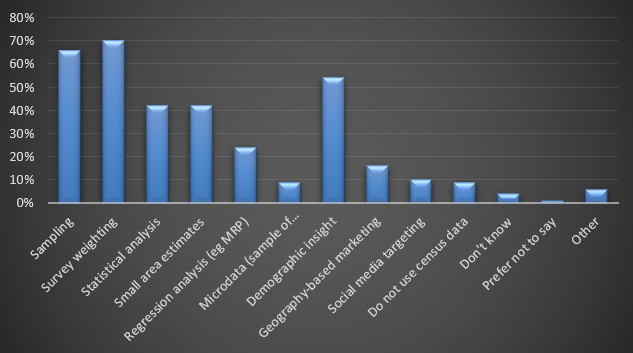
|
Answer |
% |
|
Sampling |
66% |
|
Survey weighting |
70% |
|
Statistical analysis |
42% |
|
Small area estimates |
42% |
|
Regression analysis (eg MRP) |
24% |
|
Microdata (sample of anonymised records) |
9% |
|
Demographic insight |
54% |
|
Geography-based marketing |
16% |
|
Social media targeting |
10% |
|
Do not use census data |
9% |
|
Don't know |
4% |
|
Prefer not to say |
1% |
|
Other |
6% |
|
Total |
100% |
Response Base Number: 92
Custom Reponses:
- Internal benchmarking.
- Site selection.
- Market sizing estimation.
- Common sense checks
The next question was regarding census topics and which are used by organisations at any geographic level (multi choice):
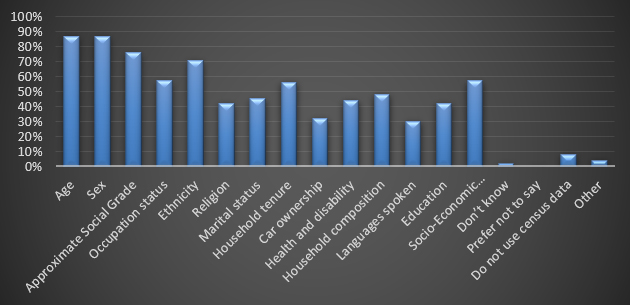
|
Answer |
% |
|
Age |
87% |
|
Sex |
87% |
|
Approximate Social Grade |
76% |
|
Occupation status |
57% |
|
Ethnicity |
71% |
|
Religion |
42% |
|
Marital status |
45% |
|
Household tenure |
56% |
|
Car ownership |
32% |
|
Health and disability |
44% |
|
Household composition |
48% |
|
Languages spoken |
30% |
|
Education |
42% |
|
Socio-Economic Classification (NS-SeC) |
57% |
|
Don’t know |
2% |
|
Prefer not to say |
0% |
|
Do not use census data |
8% |
|
Other |
4% |
|
Total |
100% |
Response Base Number: 85
Custom Reponses:
- Gender.
- Income.
MRS is very pleased that Gender Identity was introduced as a question for the 2021 Census and MRS was instrumental in the ONS consultations that lead to this.
The 2011 Census and prior only asked about Sex, hence why this was entered into our survey as an available response. Up until now this has been the only available data at geographic level.
We asked if their organisation uses any census data at small geographic areas, such as ward or output area:
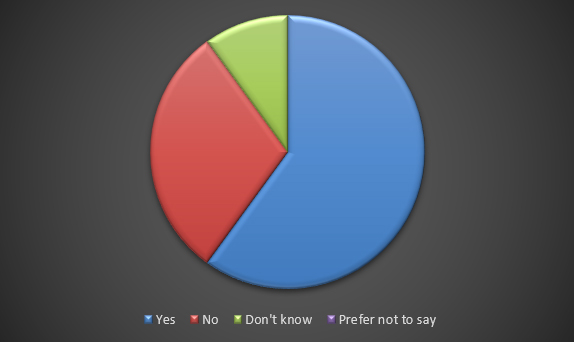
|
Answer |
% |
|
Yes |
60% |
|
No |
30% |
|
Don't know |
10% |
|
Prefer not to say |
0% |
|
Total |
100% |
Response Base Number: 82
And if they did, we then asked what census topics organisations use at small geographic areas, such as ward or output area (multi choice):
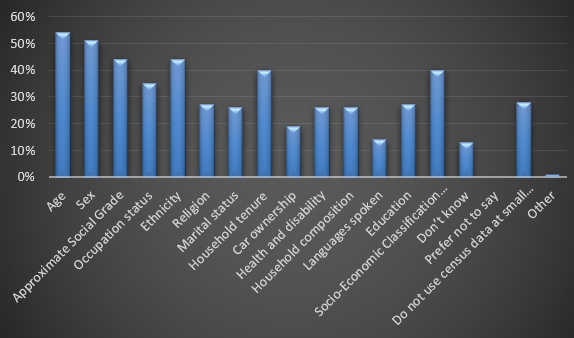
|
Answer |
% |
|
Age |
54% |
|
Sex |
51% |
|
Approximate Social Grade |
44% |
|
Occupation status |
35% |
|
Ethnicity |
44% |
|
Religion |
27% |
|
Marital status |
26% |
|
Household tenure |
40% |
|
Car ownership |
19% |
|
Health and disability |
26% |
|
Household composition |
26% |
|
Languages spoken |
14% |
|
Education |
27% |
|
Socio-Economic Classification (NS-SeC) |
40% |
|
Don’t know |
13% |
|
Prefer not to say |
0% |
|
Do not use census data at small geographic areas |
28% |
|
Other |
1% |
|
Total |
100% |
Response Base Number: 79
We then asked how important census data at small geographic areas, such as ward or output area is to their organisation:
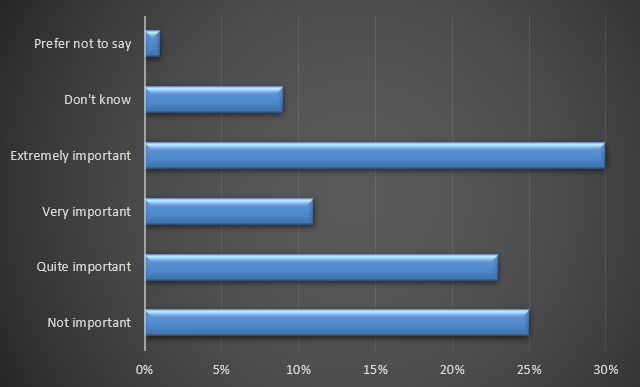
|
Not important 25% |
Quite important 23% |
Very important 11% |
Extremely important 30% |
Don't know 9% |
Prefer not to say 1% |
Response Base Number: 80
And how useful would it be to get national and regional census data more frequently than every ten years:
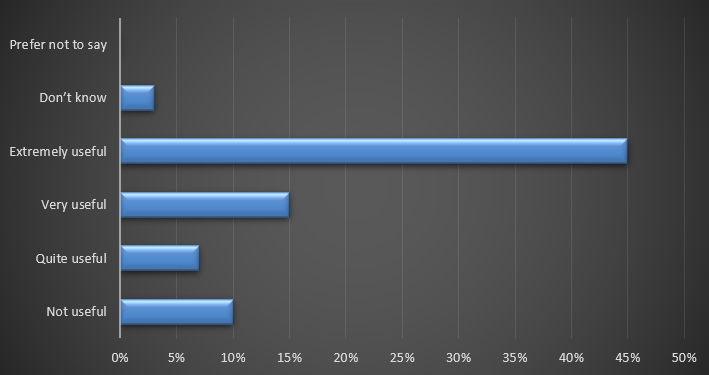
|
Not useful |
Quite useful |
Very useful
|
Extremely useful 45% |
Don’t know 3% |
Prefer not to say 0% |
Response Base Number: 79
We then asked them to consider, if the proposed changes do go ahead, and the census moves away from an all-household questionnaire to a new approach which has more frequent and timely data at national and regional level, but no longer has much data available at small geographic areas, would this be a positive or negative outcome for their organisation:
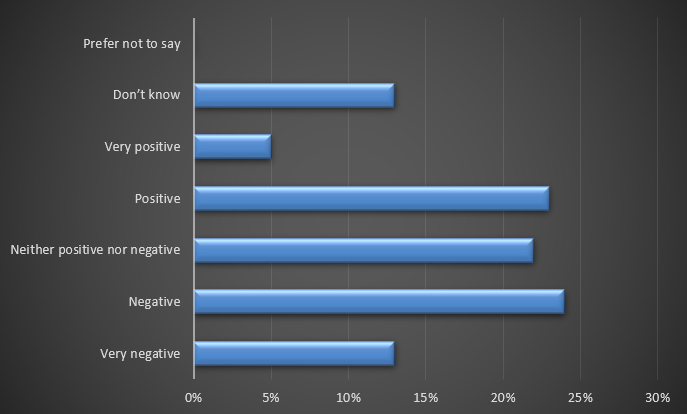
|
Very negative |
Negative |
Neither positive nor negative |
Positive |
Very positive |
Don’t know |
Prefer not to say |
|
13% |
24% |
22% |
23% |
5% |
13% |
0% |
Response Base Number: 79
In advance of the ONS consultation and MRS compiling its response, we asked if their organisation agrees to be contacted by MRS for more details about their census requirements and their views on the future of the census:
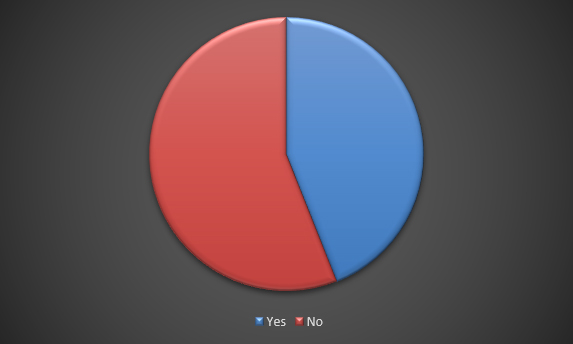
|
Answer |
% |
|
Yes |
44% |
|
No |
56% |
Response Base Number: 74
* UK GDPR: The custom responses from this question have been hidden due to identifiable data. Respondents were made aware that if they supplied the email address of someone other than themselves, they needed to ensure they were aware that they had done, and individuals would be cited as the source of their data.
We then gave respondents the opportunity to provide any further comments about the proposed ONS changes
We have provided some anonymised quotes to reflect the responses:
“Very important from our perspective to have a consistent approach across the 4 nations. While we mostly use Scotland census data, we do often need to set that in the wider UK context. Different approaches would therefore cause issues”
“Detailed census data is vital to our and our client's business. It helps us to understand the viability of projects and what ensures a representative and robust data set. It also helps us to understand where projects are not viable, so we do not launch unfeasible/unrealistic studies which do not provide our client's with actional insights.”
“We use census data for internal benchmarking for our team to ensure EDI etc. If we could have general data more frequently (say every 5 years) that would be really helpful as the landscape changes so quickly it's hard to keep up, especially post-Brexit.”
“Census is as an equal and robust method of basic data collection that is available to all (not just the digitally inclined). Local area data is essential for the underrepresented”
“The census data is an important line in the sand every 10 years, the fact that it goes to every household and is required by law to be filled in, makes it the most robust measure of demographic data available in the UK. The suggestion that it could be replaced by other official statistics and survey data is likely to introduce a huge amount of sampling bias that is not currently present, not least elements that capture information among underrepresented groups such as lower socio-economic grades, non-english speakers and low IT literacy.”
“We would be very keen to understand the quality of any non Census data that might be available and the associated management and governance of this data quality”
“The issues around the infrequency of the census is exacerbated by long length of time it takes to process the data.”
“if it is a sample it is NOT a census. This is a crazy idea - using better sources for updates between census is great, but they cannot replace it.”
“There is so much good data at local area level E.g MSOA. Taking this away would be detrimental although I can see the benefit of more frequent National and regional level.”
“I have a reasonable level of confidence that ONS could produce a near-real time admin dataset of sex/age at small area level, but I have very little confidence that any of the other Census data that is currently available at small area level could be replicated, at least not without compromising the consistent measurement quality we enjoy now.”
“I don’t like trading these things off - it’s as if you can only have increased frequency of National/regional data if you are prepared to ditch small area data. Why not provide both - more frequent top level data whilst maintaining less frequent small area data. That would be progress”
“Needs to be more transparent about how it will work. Would like to see parallel methodologies undertaken, to prove new methodology.”
“Even ten years old, this data remains very useful to survey designers. I appreciate that most of this data could be produced regularly at regional or even local authority level by combining survey data with admin data, but not at a lower level (e.g. OAs and LSOAs) without having to accept quite strong modelling assumptions. A very large share of our surveys have a sample design that is dependent on small area data that is consistent, real and - at least at one time - very accurate. Dropping the decennial Census would be a significant loss to us.”
“It will be a great shame if the gold standard census is replaced with survey data. A rich, valuable data set should not be replaced by a less robust methodology. Yes, things change faster than every ten years, but nevertheless, the confidence that an all-household read provides should not be underestimated. I think it would be a poor trade off to get weaker data more frequently.“
“Census is vital to understanding the nature of the population by location and therefore very helpful in selection the geographical location of outlets. More frequent measures would be very helpful.”
“Moving away from 10 years is a smart initiative. Demographics are changing rapidly yet we are waiting a decade to find out”
“Strong concern about lack of low-level geographic census data, which could severely impact the MRP business.”
“The Census is a critical tool for our local authority for area planning, working with our communities and funding bids. Local level data is vital for us.”
We then asked respondents to think about how the MRS can help represent their organisation's views about the census and other data.
We informed respondents that at MRS we have a committee group called the Census and GeoDems Group (CGG), which is a leading independent voice in the geodemographics sector. It exists to promote the full use of census and geodemographic information and works with the Office for National Statistics (ONS) and others to represent the needs of research.
We asked whether respondents were aware of this group’s existence:
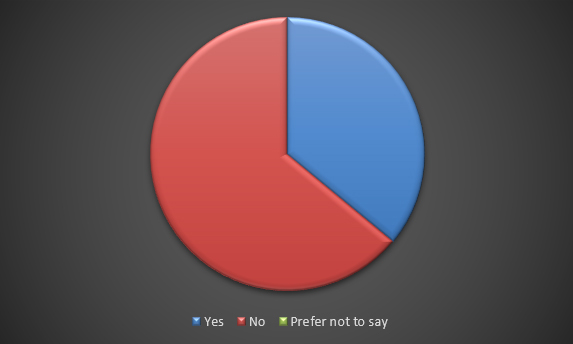
|
Answer |
% |
|
Yes |
36% |
|
No |
64% |
|
Prefer not to say |
0% |
|
Total |
100% |
Response Base Number: 72
We asked respondents which activities by the Census and GeoDems Group (CGG) they would encourage colleagues to participate in (multi choice):
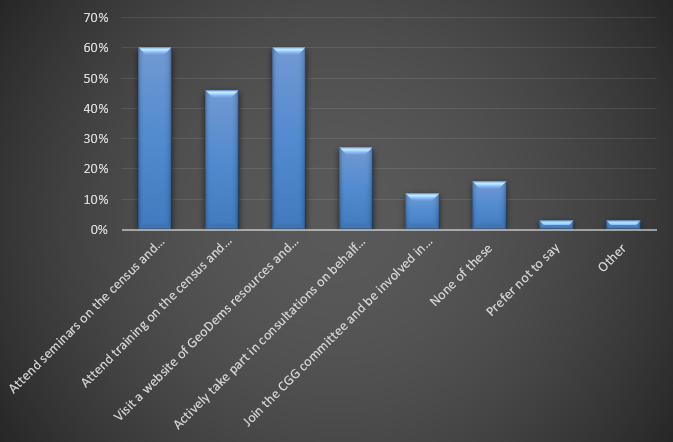
|
Answer |
% |
|
Attend seminars on the census and geodemographics |
60% |
|
Attend training on the census and geodemographics |
46% |
|
Visit a website of GeoDems resources and information |
60% |
|
Actively take part in consultations on behalf of the MRS |
27% |
|
Join the CGG committee and be involved in discussions |
12% |
|
None of these |
16% |
|
Prefer not to say |
3% |
|
Other |
3% |
|
Total |
100% |
Response Base Number: 67
We asked if they would be interested in finding out more about these CGG activities:
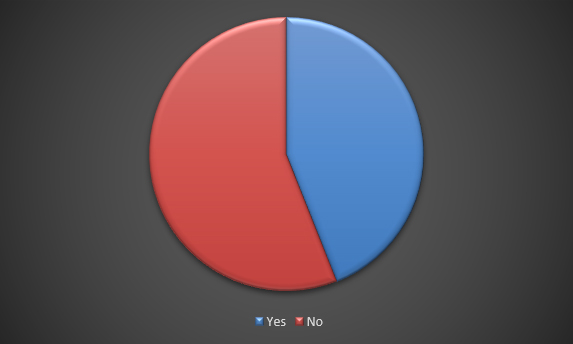
|
Answer |
% |
|
Yes |
44% |
|
No |
56% |
|
Total |
100% |
Response Base Number: 70
We received a high number of contact details to provide further information to, an MRS representative will be in touch with everyone soon. If you did not complete this survey and would like to find out more about the CGG activities, please contact cgg@mrs.org.uk
Get the latest MRS news
Our newsletters cover the latest MRS events, policy updates and research news.










